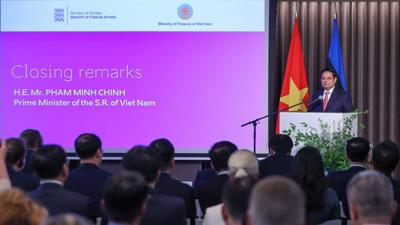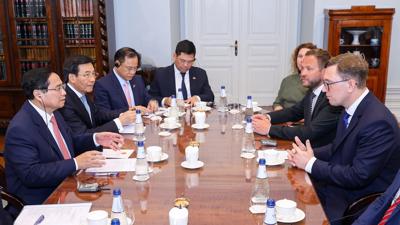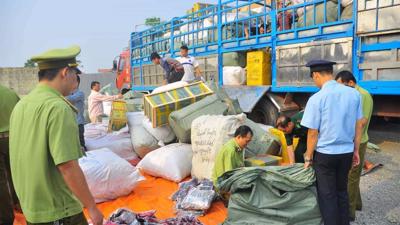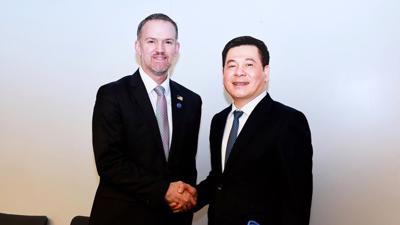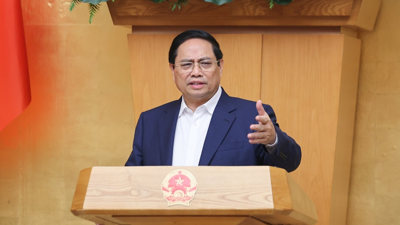Hungary reaffirms Vietnam as top Southeast Asian partner
Economic cooperation remains a key pillar, with bilateral trade turnover nearing $1 billion in 2024.

State President Luong Cuong affirmed Vietnam's enduring commitment to strengthening cooperation with Hungary, a top priority partner and its first Comprehensive Partner in Central and Eastern Europe, during talks with Hungarian President Tamás Sulyok in Hanoi on May 28.
The talks, part of President Sulyok's official visit, took place as the two nations approach the 75th anniversary of their diplomatic relations (1950-2025).
President Sulyok, on his inaugural visit to Vietnam, expressed his deep admiration for the country's remarkable achievements during its Doi Moi (Renewal) process and international integration.
He underscored that Hungary consistently views Vietnam as its most important partner in Southeast Asia and expects to further enhance collaboration across all sectors.
During their discussions, both leaders highlighted the significant progress made since the elevation of the bilateral ties to a Comprehensive Partnership in 2018, evidenced by frequent delegation exchanges at all levels.
Economic cooperation remains a key pillar, with bilateral trade turnover nearing $1 billion in 2024. Productive collaboration also continues in other vital areas, including education and training, environmental protection, culture, tourism, defense and security.
Looking ahead, the two leaders agreed on key measures to further advance bilateral relations. They committed to intensifying contacts and exchanges at all levels and across all channels to deepen political trust and mutual understanding, thereby solidifying the foundation for comprehensive cooperation in all spheres.
In the realm of trade and investment, both sides reaffirmed its status as a cornerstone of their partnership. They agreed to strengthen the role of the Joint Committee on Economic Cooperation and called for the effective implementation of the EU–Vietnam Free Trade Agreement (EVFTA) by relevant ministries, agencies, localities, and businesses from both nations.
Furthermore, the leaders underscored the importance of promoting investment in Hungary’s key sectors, including information technology, energy, agriculture, the food industry, healthcare, and pharmaceuticals. This strategic approach aims to leverage each country's unique position to facilitate access to the expansive ASEAN market (over 650 million people, combined GDP exceeding $4 trillion) and the broader EU market, particularly Central and Eastern Europe.
President Cuong expressed gratitude to Hungary for being one of the first EU nations to ratify the EU–Vietnam Investment Protection Agreement (EVIPA). He urged Hungary to continue its support for the ratification process among other EU member states and to advocate for the European Commission's swift removal of the IUU 'yellow card' warning on Vietnamese seafood exports.
Regarding education and training, both sides agreed to optimize the utilization of the 200 annual scholarships Hungary grants to Vietnamese students. Priority will be given to fields currently in high demand within Vietnam, such as medicine, pharmacy, information and communication technology, environmental studies, and agriculture.
The leaders also emphasized the importance of bolstering cooperation in established areas like national defense and security, science and technology, agriculture, healthcare and pharmaceuticals, culture, and tourism. Simultaneously, they aim to expand collaboration into emerging sectors such as digital transformation, information technology, environmental protection, and water resource management.
Addressing regional and international issues of mutual concern, including the East Sea (internationally known as the South China Sea) situation, both leaders reaffirmed the imperative of resolving disputes and conflicts globally through peaceful means. This approach, they stressed, must be anchored in the fundamental principles of the UN Charter and international law, particularly the 1982 UN Convention on the Law of the Sea (UNCLOS). Such efforts are vital for maintaining peace, stability, security, and freedom of navigation and overflight, both regionally and globally, thereby fostering global cooperation and shared prosperity.


